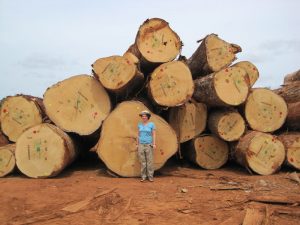
Abstract
More than half of the world’s remaining old-growth forests are production forests, i.e. they are subject to industrial logging. Often, industrial logging is conducted by foreign corporations, in logging concessions. We measured the impacts of foreign logging concessions and forest management plans on deforestation and timber production in the Central Africa, which contains the second largest extent of tropical forests in the world.
The Project
We investigated this in the Congo Basin, which is the second largest remaining tropical forest in the world, and home to many of the most threatened animals in the world, including forest elephants and lowland gorillas. We found that despite selective logging practices, concessionary logging does lead to deforestation, because logging roads are built to extract trees, and villages are established and grow because of workers who arrive to work in the logging industry.
Especially alarming is that the logging roads penetrate Intact Forest Landscapes, providing access by bushmeat hunters to previously inaccessible core forests and the threatened animals that inhabit them.
The Team
Jodi Brandt, Boise State University
Other Collaborators:
Arun Agrawal, University of Michigan
Christoph Nolte, Boston University
Products
Brandt, J. S., C. Nolte, and A. Agrawal. 2018. Deforestation and timber production in Congo after implementation of sustainable management policy: A response to Karsenty et al. (2017). Land Use Policy 77:375-378.
Brandt, J. S., C. Nolte, and A. Agrawal. 2016. Deforestation and timber production in Congo after implementation of sustainable forest management policy. Land Use Policy 52:15-22.
Brandt, J. S., C. Nolte, J. Steinberg, and A. Agrawal. 2014. Foreign capital, forest change and regulatory compliance in Congo Basin forests. Environmental Research Letters 9.